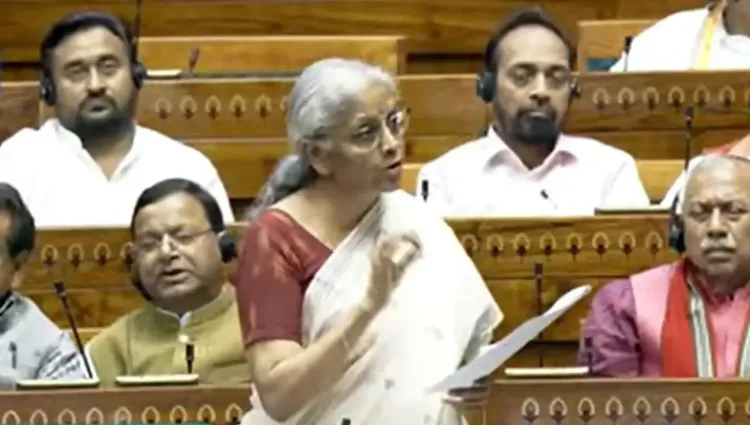Lok Sabha Approves Finance Bill 2025

Synopsis
Key Takeaways
- Lok Sabha passed Finance Bill 2025.
- Includes 35 government amendments.
- Focus on tax relief and domestic production.
- New Income Tax Bill to be discussed soon.
- Budget deficit target set to 4.4% of GDP.
New Delhi, March 25 (NationPress) The Lok Sabha approved the Finance Bill 2025 on Tuesday, which included 35 government amendments as a crucial part of the Union Budget 2025-26 proposals.
In her response to the debate on the Finance Bill, Union Finance Minister Nirmala Sitharaman stated that the 2025-26 Union Budget offers "unprecedented tax relief to honor taxpayers" while focusing on enhancing domestic production and improving export competitiveness.
She emphasized the changes aimed at tariff rationalization and promoting domestic manufacturing during her discussion of the Finance Bill.
The Customs Duty rationalization introduced in the Budget proposals for 2025-26 is progressing as planned.
The Finance Minister mentioned that the government is eliminating seven customs tariff rates to tackle duty inversion and reduce input costs. The Finance Bill now guarantees that imports will incur either a cess or a surcharge, but not both.
To stimulate domestic production, the government has also exempted 35 additional capital goods for EV batteries and 28 for mobile manufacturing from customs duties.
With the Lok Sabha's approval of the Budget, it will now be discussed in the Rajya Sabha, which, however, lacks the authority to vote on the Budget or reject any proposals.
The Finance Minister also announced that a new Income Tax Bill to replace the Income Tax Act, 1961 will be discussed during the Monsoon Session of Parliament.
Furthermore, the Finance Minister has set the budget deficit target on a declining trajectory to 4.4 percent of GDP for 2025-26, down from 4.8 percent of GDP in 2024-25.
To foster growth, the Budget aims to increase demand by exempting 1 crore individuals with annual incomes up to Rs 12 lakh from tax, thereby increasing disposable income for the middle class to enhance spending.
The net market borrowing for the budget is set at Rs 11.54 crore, with the remaining funds sourced from small savings schemes.
The Budget anticipates a gross tax revenue collection of Rs 42.70 lakh crore and a gross borrowing of Rs 14.01 lakh crore.
The Union Budget 2025-26 envisions a total expenditure of Rs 50.65 lakh crore, marking a 7.4 percent increase over the current fiscal year.
It maintains fiscal prudence without sacrificing expenditure quality, proposing total capital expenditure of Rs 11.22 lakh crore, increasing from Rs 10.2 lakh crore as per FY25 RE.
The Budget seeks to significantly boost employment-led growth with its emphasis on the agricultural sector, MSMEs, and exports while adhering to a path of fiscal consolidation to ensure economic stability.









